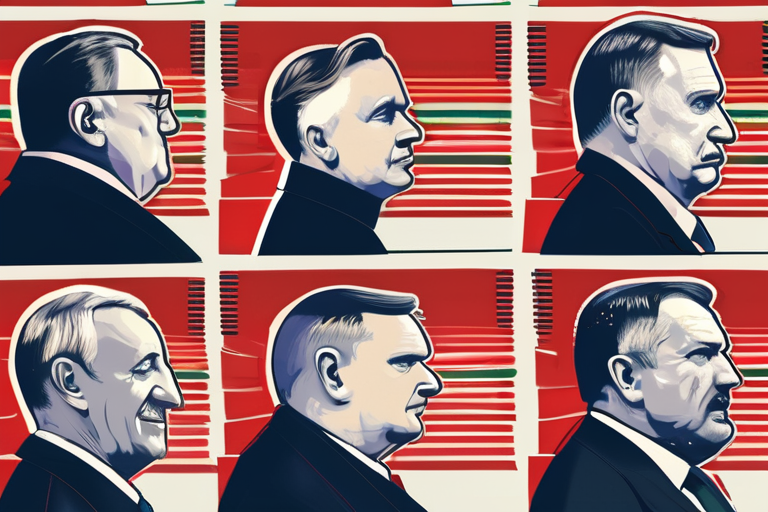Hungary: Hate Speech and Media Pressure in Election Run-up
BUDAPEST, HUNGARY - SEPTEMBER 27, 2025 - Thousands of protesters took to the streets last weekend to voice their anger at hate speech and incitement in public discourse ahead of Hungary's parliamentary elections.
The protests followed the tragic death of a police chief in the southern city of Hodmezövasarhely, who had been subjected to personal attacks in a pro-government local newspaper after permitting a rally critical of the governing Fidesz party. The paper had also exhorted readers to take violent action at the event.
"It's not clear what role his tragic death played, but it highlights the increasingly acrimonious nature of public discourse in Hungary," said Gabor Polyak, a professor of media law and policy at Eötvös Lorand University in Budapest. "For a long time now, we've seen public debate becoming more aggressive."
According to Polyak, politicians are using hate speech and propaganda to dehumanize groups and create an atmosphere of hostility. "This is the neurotoxin of propaganda," he said.
The protests were organized by various civil society groups and opposition parties, who accused the government of using state media to spread hate speech and incite violence against opponents. The protesters called for greater press freedom and an end to what they saw as the manipulation of public opinion through biased reporting.
Government officials have denied any wrongdoing, saying that their policies are aimed at protecting national interests and maintaining law and order.
"Hungary is facing serious security threats from outside, and we need to take measures to protect our citizens," said a government spokesperson. "We will not tolerate hate speech or incitement to violence."
The protests were the latest in a series of demonstrations against what critics see as the erosion of democratic norms and the rise of authoritarianism under Prime Minister Viktor Orban's leadership.
Orban has been accused of using his office to consolidate power and undermine institutions such as the judiciary, parliament, and media. His government has also faced criticism for its handling of migrants and refugees, which some say has contributed to a climate of xenophobia and intolerance.
The parliamentary elections are scheduled for next year, and many analysts believe that the current atmosphere of polarization and hostility will only intensify in the run-up to the vote.
"It's a very worrying trend," said Polyak. "If we don't address this issue now, it could have serious consequences for our democracy."
As the election campaign heats up, observers will be closely watching how the government responds to criticism from opposition parties and civil society groups. Will they take steps to address the growing problem of hate speech and media manipulation, or will they continue to use these tactics to maintain their grip on power? Only time will tell.
Background:
Hungary has been a member of the European Union since 2004 but has faced criticism for its handling of democracy and human rights. The country's parliament passed a law in 2022 that critics say restricts press freedom and allows the government to exert greater control over media outlets.
The law, known as the "Media Act," requires media companies to register with the authorities and adhere to strict rules on content. Critics say it is designed to silence opposition voices and promote pro-government propaganda.
In recent years, Hungary has also seen a rise in hate speech and xenophobia, particularly against migrants and refugees. The government has been accused of fueling this atmosphere through its rhetoric and policies.
The protests last weekend were the latest expression of public discontent with what many see as the erosion of democratic norms and the rise of authoritarianism under Orban's leadership.
Additional Perspectives:
"We will not be intimidated by these protests," said a government spokesperson. "Our policies are aimed at protecting national interests and maintaining law and order."
"The government is using hate speech and propaganda to divide the country and maintain its grip on power," said an opposition party leader. "We will continue to speak out against this and demand greater press freedom."
Current Status:
The protests last weekend were a significant expression of public discontent with what many see as the erosion of democratic norms and the rise of authoritarianism under Orban's leadership.
As the election campaign heats up, observers will be closely watching how the government responds to criticism from opposition parties and civil society groups. Will they take steps to address the growing problem of hate speech and media manipulation, or will they continue to use these tactics to maintain their grip on power? Only time will tell.
*Reporting by Dw.*



 Hoppi
Hoppi

 Hoppi
Hoppi

 Hoppi
Hoppi

 Hoppi
Hoppi

 Hoppi
Hoppi

 Hoppi
Hoppi











